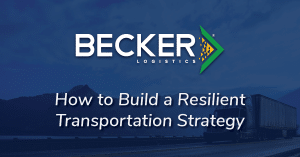Food and beverage logistics is one of the most demanding areas in supply chain management and can lead to many challenges. Every shipment is time-sensitive, quality-sensitive, and often temperature-sensitive. When something goes wrong, the consequences ripple across businesses and reach consumers quickly.
From fresh produce and frozen meals to bottled drinks and packaged snacks, food logistics directly affects availability, pricing, and safety. That’s why businesses need a logistics partner that understands these stakes and has the tools to manage them.
A skilled third-party logistics provider (3PL) brings experience, real-time technology, and industry expertise to navigate these high-pressure shipments. Let’s break down the biggest challenges in food and beverage logistics and how the right 3PL helps overcome them.
Key Challenges in Food and Beverage Logistics
1. Perishability: The Race Against Time
When it comes to perishables, speed and precision matter. Many food and beverage products require temperature-controlled shipping using refrigerated trailers (reefers) or insulated containers. Fresh produce, dairy, and frozen goods can spoil quickly without the proper environment.
Sanitation is also crucial. Only food-grade trailers should be used, and strict cleaning procedures must be followed. Fragile goods like glass-bottled beverages require careful handling to avoid breakage.
A reliable 3PL helps manage this risk by using vetted carriers, ensuring proper equipment, and providing real-time tracking. This allows shippers to maintain product integrity from origin to destination.
2. Food Safety Regulations: High Stakes Compliance
Food and beverage logistics must comply with various federal regulations including the FDA’s Food Safety Modernization Act (FSMA), USDA standards, and Hazard Analysis and Critical Control Points (HACCP) procedures. These rules require clear documentation, traceability, and properly cleaned equipment.
Non-compliance can result in major fines, product recalls, and brand damage. A trusted 3PL ensures compliance through detailed standard operating procedures, ongoing training, and partnerships with carriers who meet industry standards.

3. Seasonality: Peaks, Valleys, and Planning Ahead
Seasonal trends have a huge impact on food and beverage logistics. Harvest time leads to spikes in produce shipments, and holidays increase demand for beverages and packaged foods. These seasonal surges can cause rate volatility and tighter capacity, especially for reefer equipment. You can learn more about the the specific seasonality of different produce here.
An experienced 3PL helps companies plan ahead with accurate forecasting and scalable solutions. When demand shifts, a 3PL can quickly adjust service levels to keep freight moving without disruptions.
4. The Need for Agility and Visibility
Food supply chains move fast and are vulnerable to last-minute changes, including delivery rejections, traffic delays, or facility issues. Visibility into your shipments is key to staying ahead of problems.
Advanced 3PLs use technology like transportation management systems (TMS), API integrations, and customer portals to provide real-time updates. This allows shippers to respond quickly, reroute freight, and communicate effectively across the supply chain.
Choosing the Right Partner Makes All the Difference
Food and beverage logistics requires a high level of expertise, precision, and adaptability. Challenges like perishability, regulatory compliance, seasonal demand, and rapid change can all be overcome with the right logistics partner.
At Becker Logistics, we understand the pressures of shipping food and beverage products. Our team brings years of experience, cutting-edge technology, and a network of trusted carriers to ensure your freight arrives safely and on time. Contact us if you want to learn more about how we can help.




